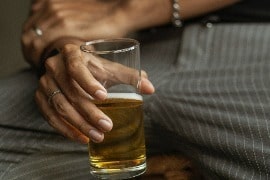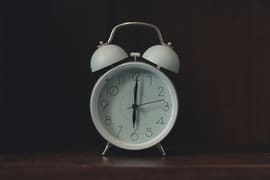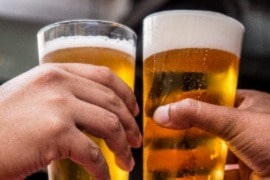Having a drink before bed may seem like a way to relax and unwind. However, alcohol is actually detrimental to getting a good night’s rest.
Drinking and sleep are not a good combination. A person might think that having a drink before bed may help them sleep because alcohol helps them relax. However, alcohol is detrimental to getting a good night’s rest. Because of drinking’s negative impact on sleep cycles, a person does not sleep as well if they drink before bed.
For some people, sleep without alcohol seems impossible. Sleep disorders like insomnia can co-occur with alcohol abuse, and treating insomnia can improve a person’s sleep quality while in recovery.
The Human Sleep Cycles
While sleeping well, a person’s brain goes through a predictable pattern. This pattern has two distinct components:
- Non-REM (NREM), followed by
- REM (Rapid Eye Movement)
At the beginning of the NREM cycle, within seconds to just a few minutes after nodding off, alpha and theta brain waves cause eye movement to slow down. This is a stage of light sleep where the individual can be easily woken. This usually lasts a few minutes.
The brain then moves on to the next stage of light sleep, but there is an increase in brave wave frequency, followed by a further slowing down. This process of powering up and then slowing down helps to further slow activity in the brain. Your brain spends more time in this stage of sleep than in other stages.
Next, the brain begins producing slower delta waves. This causes eye movement and muscle activity to cease. It’s harder to wake the person as they become unresponsive to outside stimuli. This stage is what is referred to as “restorative sleep” – when the body works to repair itself and boost functions. This stage lasts longer in the first half of the night.
REM sleep is when the brain becomes more active. Eye movement increases, often seeming to jerk around, breathing increases and can be irregular and shallow, blood pressure increases and dreams begin. REM sleep is a critically important stage. During this period, learning, memory, and processing functions of the brain are enhanced, affecting a person’s long-term memory capacity.
The duration of these sleep stages can vary by person and by age. Throughout the night, your brain will cycle through all of the sleep stages multiple times to give you a good night’s rest.
When alcohol has been introduced to the sleep cycle, the functions of the brain are impeded, and the cycles become disrupted. This is particularly true if you drink within an hour of bedtime. This sleep cycle disruption is what causes the person to feel tired and “fuzzy” the next day and can lead to further sleep issues, such as insomnia or alcohol addiction over time.
Studies have shown that when you get up the next day, you may be less alert because of your drinking the night before, even though you no longer have alcohol left in your body.
Why Does Alcohol Make You Sleepy?
Alcohol can make you feel sleepy because it is a central nervous system depressant. Alcohol affects the brain by affecting neurotransmitters, including GABA (gamma-aminobutyric acid). GABA is a neurotransmitter that dampens activity in the brain, directing the brain to slow down.
Alcohol also impacts other chemicals like adenosine, which prevents the brain from becoming stimulated. These processes produce a relaxed and tired sensation.
Can’t Sleep Without Alcohol? Issues With Drinking To Fall Asleep
Drinking to fall asleep can cause or worsen some health issues over time. These include breathing issues like sleep apnea, which is linked to drinking.
Alcohol can also harm your circadian rhythm. In a normal circadian rhythm, hormones are released at certain times throughout the day. Alcohol interrupts this process, causing abnormalities in how circadian hormones are released.
Alcohol and Sleep Apnea
When a person has sleep apnea, they have interrupted breathing during the night. This can cause them to rouse hundreds of times while sleeping. The condition is linked to fatigue as well as serious cardiovascular conditions like heart attack and stroke. Sleep apnea can persist for years even after you stop drinking.
When you have sleep apnea, drinking can make the breathing interruptions last longer when you are asleep, leading to more awakenings. Upon waking, you may feel extremely groggy. Studies have shown that people who drink and have sleep apnea are at a much higher risk of traffic accidents than people with sleep apnea who do not drink alcohol.
Can Alcohol Cause Sleep Apnea?
Alcohol and sleep apnea are interrelated. Sleep apnea can be caused or worsened by drinking. Doctors have found that on its own, alcohol can narrow your upper airway and lead to sleep apnea problems, even if you have never had them before.
There are health risks linked to drinking and sleep apnea, especially if you snore. These risks include:
- Heart attack
- Heart rhythm problems
- Stroke
- Sudden death
Alcohol and Insomnia
Insomnia is a common condition where a person has trouble falling asleep or staying asleep. Up to 40% of the general population experiences insomnia, while as many as 72% of people with an alcohol use disorder may have the condition.
In an attempt to fall asleep, some people have a drink before bed. One study shows that this is the reason about 10% of people drink alcohol. Because alcohol can have a depressive effect on the brain, drinking may help some people fall asleep faster.
However, over the long term, alcohol does not help insomnia. Tolerance to alcohol can rapidly develop. For this reason, a person may need to drink increasing amounts to fall asleep, increasing the risk of alcohol abuse and addiction. Researchers have found that insomnia is a risk factor for alcohol abuse.
Does Stopping Alcohol Consumption Cause Insomnia
Alcohol can cause insomnia because of the damage that alcohol can do to your sleep cycles and circadian rhythm. This can lead to additional effects like daytime sleepiness and grogginess. The impact of drinking on insomnia may be particularly acute in older adults.
Insomnia After Binge Drinking
Binge drinking occurs when a man has five drinks, or a woman has four drinks within two hours. This pattern of drinking is linked to insomnia, which can develop after binging. One study on binge drinking and insomnia found that people who binged two days a week had an 84% higher chance of having insomnia.
How to Fall Asleep Without Drinking Alcohol
Many people rely on alcohol’s calming effect after a rough day. They may believe it reduces their anxiety over the day’s events and helps them get to sleep. If this pattern repeats daily, a person is more likely to become dependent upon alcohol to fall asleep. Alcohol dependence can lead to alcohol addiction.
Shaking this addiction and learning to sleep without alcohol can be difficult. The idea of attempting to sleep without alcohol can cause anxiety, which can lead to more drinking, perpetuating the cycle of alcohol abuse.
For the recovering alcoholic, sleeping properly can be one of the harder things to accomplish. Sleeplessness is one of the most common side effects associated with alcohol withdrawal in the early days of sobriety.
Falling asleep and getting a full night’s rest are real problems that need to be managed effectively to maintain sobriety. Thankfully, sleeping without alcohol is an achievable goal if you follow several recommended strategies.
Good Sleeping Habits
Establishing good sleeping habits, also known as sleep hygiene, is an essential first step in good sleep. Ideally, you should wake up and go to bed at the same time each day. Your bedroom should be quiet and dark. Stimulants such as caffeine should be avoided, especially at night. Using electronics like TV or smartphones before bed should also be avoided.
Personal Relaxation Methods
Multiple relaxation methods can be used to help you wind down and fall asleep. These include breathing exercises, visualization exercises and progressive muscle relaxation.
Getting Exercise
Staying physically active during the day can help you fall asleep at night, as well as promote overall health.
No Substitutions
Taking any other substances that have a sedative effect should be avoided unless a doctor prescribes them. Doing so without medical supervision can trigger a new addiction to another substance.
Alcohol’s Lasting Effects on Sleep
Because of the damage that alcohol can do to your sleep cycles, sleep problems are common, even if you stop drinking. You may notice some worsened insomnia during alcohol withdrawal. However, you may continue to have trouble sleeping for years after you stop drinking.
Some people in recovery may try to start drinking again to improve their sleep. However, the alcohol will continue to damage their sleep cycles, and the problem will not get better.
Alcohol Withdrawal and Insomnia
In addition to experiencing insomnia after drinking alcohol, stopping alcohol use after persistent heavy consumption can also cause chronic insomnia. There are several major sleep-related changes that occur when a person stops alcohol use:
- Increase in awakenings throughout the night
- Reduced length of deep sleep
- Reduced duration of restorative sleep
Alcohol withdrawal insomnia is so common that it is one of the diagnostic criteria for alcohol withdrawal. Insomnia from alcohol withdrawal is likely to persist through the initial period of abstinence. Insomnia after alcohol withdrawal may, in some cases, persist for months or years. Insomnia is one of the largest setback triggers for people in recovery from an alcohol use disorder.
Treating Co-Occurring Insomnia and Alcohol Addiction
For the treatment of either disorder to be effective, both insomnia and substance abuse should be addressed together. Someone in recovery from alcohol use may experience setbacks because of sleep-related withdrawal symptoms.
Increased insomnia takes a toll on someone in recovery. Without proper treatment, returning to alcohol use may seem to be the only solution. Insomnia is treatable.
With help from experienced professionals, substance use and co-occurring insomnia can be treated effectively. If you believe your drinking may be problematic, you may learn about the differences between casual and problematic drinking by taking a self-assessment. If co-occurring substance use and insomnia are causing problems in your life or the life of a loved one, reach out to a representative to begin the journey towards recovery.
Articles Related to Alcoholism

Alcohol detox isn’t easy and not everyone can do it on their own. That is why alcohol detox and alcohol withdrawal treatment is administered by medical professionals.

Alcoholism takes many forms, and the stereotype doesn’t always hold true. So when do a few drinks with friends become a full-blown alcohol addiction? How do you know if you are an alcoholic?

While cirrhosis scars from excessive drinking are irreversible, quitting alcohol and leading a healthier lifestyle can help your liver heal from alcohol-related liver disease.

When detoxing, hydration is key. However, certain food groups also have benefits when it comes to helping with the discomfort of withdrawal symptoms and detoxification.

Detox from alcohol can begin within hours. Typically, alcohol withdrawal symptoms happen for heavier drinkers. Alcohol withdrawal can begin within hours of ending a drinking session.

Daily drinking can have serious consequences for a person’s health, both in the short- and long-term. Many of the effects of drinking every day can be reversed through early intervention.


American Academy of Sleep Medicine. “Frequent binge drinking is associated wi[…]toms in older adults.” June 10, 2013. Accessed April 25, 2021.
Arnedt, J. Todd; Conroy, Deirdre A.; Brower, Kirk J. “Treatment Options for Sleep Disturbances[…]ing Alcohol Recovery,” Journal of Addictive Diseases, 2007. Accessed April 25, 2021.
Substance Abuse and Mental Health Services Administration. “Treating Sleep Problems of People in Rec[…]stance Use Disorders.” Fall 2014. Accessed April 25, 2021.
National Institute on Alcohol Abuse and Alcoholism. “Alcohol and Sleep.” July 1998. Accessed April 25, 2021.
National Institute of Neurological Disorders and Stroke. “Brain Basics: Understanding Sleep,” August 13, 2019. Accessed April 25, 2021.
National Institute on Alcohol Abuse and Alcoholism. “Sleep, Sleepiness, and Alcohol Use.” Accessed April 25, 2021.
Dopheide, Julie A. “Insomnia Overview: Epidemiology, Pathoph[…]harmacologic Therapy,” American Journal of Managed Care, 2020. Accessed April 25, 2021.
Centers for Disease Control and Prevention. “Binge Drinking.” December 30, 2019. Accessed April 25, 2021.
Centers for Disease Control and Prevention. “Tips for Better Sleep.” July 15, 2016. Accessed April 25, 2021.
Newsom, Rob. “Relaxation Exercises to Help Fall Asleep.” December 18, 2020. Accessed April 25, 2021.
The Recovery Village aims to improve the quality of life for people struggling with substance use or mental health disorder with fact-based content about the nature of behavioral health conditions, treatment options and their related outcomes. We publish material that is researched, cited, edited and reviewed by licensed medical professionals. The information we provide is not intended to be a substitute for professional medical advice, diagnosis or treatment. It should not be used in place of the advice of your physician or other qualified healthcare providers.